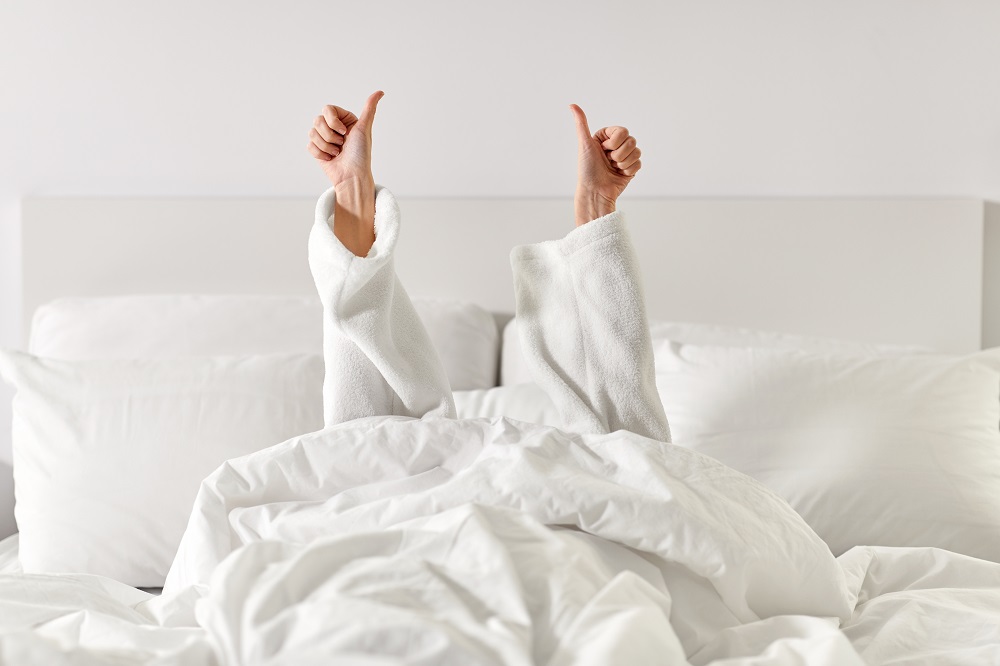
Menopausal women in Australia face unique challenges when it comes to menopause symptoms, thanks in part to our warm, humid climate. For many women who live in states that abide by daylight savings hours throughout much of the year, the transition from daylight savings to a standard time zone can be particularly tough to navigate. With the end of daylight saving time here, it’s time to refresh yourself on the tips and tricks to getting a great night’s sleep throughout menopause.
How menopause impacts our sleep
Whether you are in the midst of menopause or will begin your transition in the near future, understanding the link between menopause and sleep can help you navigate disruptions with as minimal an impact as possible.
Menopause impacts sleep in a wide variety of ways, including:
- Hormonal changes: as the body produces less oestrogen and progesterone, this can lead to ongoing sleep disturbances. Insomnia and night sweats are common side effects of menopause and are directly linked to reduced hormone levels.
- Hot flushes: hot flushes don’t discriminate when it comes to the time of day they can suddenly occur. Bringing a sudden sensation of heat (often an overwhelming one) that can result in intense sweating, hot flushes can make it challenging for women to fall asleep, or can wake them up in the midst of sleep. When a hot flush occurs at night, it’s often referred to as night sweats.
- Mood swings: one of the major impacts of menopause affects a woman’s ability to regulate her moods. With hormonal fluctuations impacting the body’s normal mood regulation systems, emotional changes can be a common experience during each stage of menopause. Anxiety, depression and irritation can all cause disruption to sleep, bringing unique challenges when it comes to settling down for the evening.
With no single culprit behind menopause’s detrimental impact on sleep, finding relief from these symptoms can require a multi-pronged treatment approach.
Start with the basics: creating a healthy sleep environment
One of the simplest ways you can support yourself during menopausal transitions is by setting up a restful, protected sleep environment. This environment can help to promote a good night’s sleep each night, and to make sure no other issue is getting in the way of improving your sleep quality.
- Set the mood. A cool, dark and quiet bedroom is the cornerstone of a healthy sleep environment. If your bedroom is fluctuating in temperature, this can increase the likelihood of hot flushes and night sweats keeping you awake or waking you up once you’ve fallen asleep. Options like air-conditioning and fans are great ways to add cooling options to your bedroom across each season. You can also make the most of cool water if you’re woken up with hot flushes by having this close at hand – insulated water bottles can provide cool relief for hours, as well as keeping you hydrated as you experience increased sweating.
- Satisfy the senses. If your bedroom isn’t in a naturally dark area, consider installing black-out blinds. These can have a dramatic impact on your ability to control light in your room. If noise is a problem, opt for solutions like earplugs or white noise machines to help you minimise noise disruptions during the night.
- Consider your bed. It’s also crucial to have a high-quality mattress and pillow. If your bedding isn’t supportive of peaceful rest, you’re more likely to experience menopause-related disruptions as you try to get comfortable each night. Simply purchasing a new pillow can make a world of difference when it comes to sleep – this might be the cheapest solution yet if it’s been some years since your last fresh pillow!
- Find better bedding. It’s also worth swapping out your sheets for breathable, moisture-wicking options. Check your pyjamas, too, to make sure you’re sleeping in breathable fabrics. If the fabrics you’re trying to rest in are keeping you warmer than necessary, making the move to materials that help to regulate your body temperature can result in noticeable improvements.
- Tech-free zone. Finally, it’s important to resist the urge to bring your phone to bed with you. Not only does the screen’s light impact your ability to naturally drift off, but having a constant source of access to the world can increase stress, rather than reduce it. By leaving your phone to charge outside of your bedroom, you’re likely to notice a more restful experience as you move through your wind-down routine for the evening.
Minimise menopause disruptions with healthy sleep patterns
Not only is the environment you’re sleeping in important to review, but evaluating your sleep patterns can highlight where you can make the menopausal transition easier on your brain and body.
If menopause symptoms are keeping you from high-quality sleep, make sure you’ve considered the following:
- How much caffeine and alcohol are you consuming? Limiting your intake in these areas, particularly in the evening, can help to promote healthy sleep.
- Establish a relaxing bedtime routine. This may include reading, meditation, a skincare routine and more in order to send your brain and body subconscious cues that it’s time to wind down for the evening.
- Embrace the benefits of regular exercise. By moving your body throughout the day, you’re helping to create physical weariness, a necessary key in consistent, high-quality sleep.
Seek help from a professional
Menopause doesn’t need to be navigated alone. By working with a team of experts who are focused on providing you with the support you need, you can have a smoother menopause experience, making the most of professional support in managing your symptoms.
The Australian Menopause Centre’s team work with women across Australia in reducing the impact of menopause. Our treatment options can provide relief from insomnia, disruptive sleep and challenging menopause symptoms across the course of everyday activities. Find supportive, friendly and expert care with our team, and you’ll be one step closer to the quality of sleep you’ve been dreaming of.